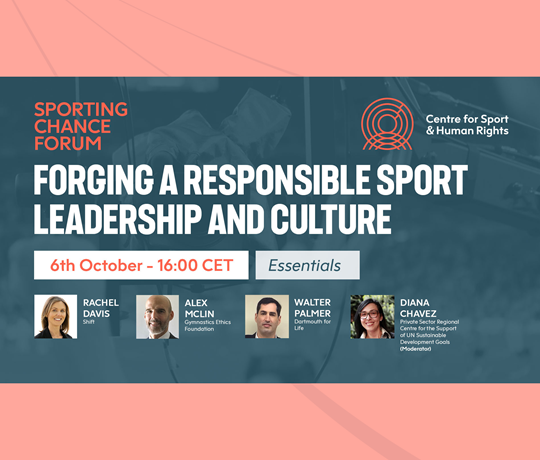Forging a Responsible Sport Leadership and Culture
Session Summary
Intangible qualities are as essential to embedding respect for people in an organisation’s governance and culture as measurable steps like policies, dedicating resources, putting clauses in supplier contracts, and setting up grievance mechanisms. Shift Ltd argues that to end harmful practices to people in and around sport the following are key:
- authenticity – with leaders modelling good behaviour and matching policies to practice when faced with hard choices or competing priorities
- empathy – respecting and learning from the lived experience of victims, survivors, or whistle-blowers
- organisation-wide learning - building human rights capacity across the value-chain, including at the top, that is informed by the perspective of affected stakeholders, and
- shared accountability – with buy-in for human rights held across an organisation.
Responsible sport leaders need to grow beyond “too much happy talk” and a fear of complaints. Creating a true learning culture hinges on being able to celebrate successes and being prepared to admit to mistakes, instead of going on the defensive if criticised. A litmus test is how sports bodies handle complaints – leading organisations don’t seek to minimise or negative criticism but look at what complaints can teach them about their systems.
A gap has opened between the promise and the reality of sport. Too many people are being hurt, and abusive practices have been normalised. Sexual abuse scandals in US gymnastics and the National Women’s Soccer League, highlight the loopholes that now seem prevalent in sports governance, and point to a crisis in culture and leadership. It is time to impart a sense of urgency. Sport leaders should not underestimate the power and anger of people who have been hurt, or their ingenuity and bravery, but avoiding these issues is to risk being blindsided by them. Conversely the chance to exert leadership is wide open.
Sport is a trillion-dollar business, which creates financial imperatives for performance on the field of play and commercially. Institutionalised power imbalances between sport and the athletes - manifested through punishment, humiliation, extreme physical exertion, and threats of exclusion – are increasing risks to people. Leaders needs to examine evidence of more energy, better performance, and longer playing careers being delivered through hard work, creating positive, safe and empowering sports environments free from discrimination, and where athletes are justly compensated, and/or able to organise and collectively bargain.
The Gymnastics Ethics Foundation, set up by the International Gymnastics Federation, is an independent entity able to receive reports from whistle-blowers and witnesses, run independent investigations, and support compliance. It supports capacity-building, seeks to shine a light on systemic problems, and to galvanise positive change, including through nurturing dialogue and leadership. Efforts to cascade this work from the international level to national federations, however, will likely also require some element of regulation.
Sport has a complex institutional landscape at the national and international levels. This presents similar challenges to what large corporations face in managing their supply chains, and at present the system is failing people. Sport leaders favour self-regulation, as evidenced by the work of the Governance Task Force of the Association of Summer Olympic International Federations (ASOIF), which has developed fifty metrics across five key governance areas to encourage better governance throughout the pyramid of sport. What still needs to be resolved is how to ensure leaders feel accountable for their performance, and how to ensure accountability to athletes and other affected people, including at the national level. Ways also need to be found to link how risks to people are identified, assessed, and addressed into how the adequacy of metrics are assessed.
Leaders need help to bring their organisational culture into alignment with international human rights norms and the values sport publicly espouses. The Centre for Sport and Human Right is well placed to be a safe space to initiate due diligence discussions, and to help raise awareness, build capacity, and create lasting value in sport. The Centre can help provide guidance, tools and access to networks, particularly on the key components that differentiate human rights due diligence from other governance considerations, namely assessing risks of impacts on people through engagement with affected groups, and ensuring access to effective remedy for survivors and victims of human rights violations.
The autonomy of sport governing bodies is increasingly being viewed as a luxury that needs to be earned. Federations and associations have a window of opportunity to hold themselves accountable to athletes, fans, workers, and communities, including through collective agreements, or through incentivising good human rights practice, such as linking board and committee posts to due diligence performance. Governments however are starting to examine whether sports bodies have become insulated from basic domestic democratic standards of accountability, and have begun to coalesce through issuing consensus statements on the relevance of human rights in sport. Unless sport begins to exhibit a more responsible autonomy, governments may start to act more robustly to hold sport accountable, for example by linking sports funding, or the underwriting for sport events, not just to athletic sporting performance but also to good human rights practices.
Watch the full session here
Click here to watch the SCF21 sessions on demand on YouTube